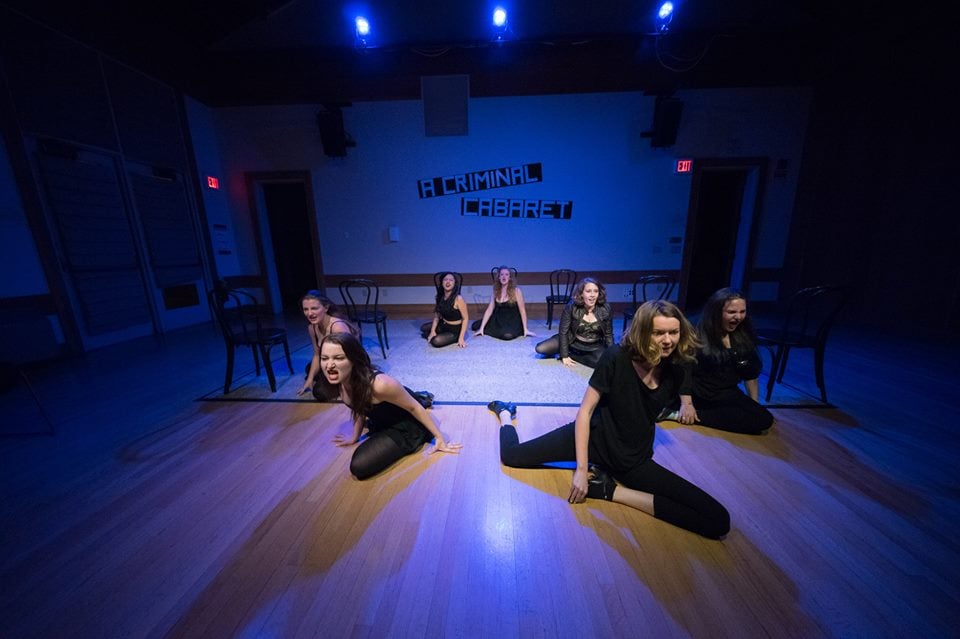Last Friday, the Stanford theater community saw the opening of At the Fountain Theatricals’ production of “A Criminal Cabaret,” a collection of some of the most scandalous crime-themed pieces in contemporary musical theater. Directed by Michael Whalen ‘16 and under the musical direction of the incredible Makulumy Alexander-Hills ‘16, “A Criminal Cabaret” showcases some of the most talented emerging voices at Stanford today.
Intimately staged at the Elliott Program Center with nothing more than a modest arrangement of cabaret-styled stools and makeshift stage to set the scene, the show proves effective in challenging some of the audience’s most deeply-held conceptions of what musical theater is (and what it should be). The proximity with which we are able to engage with the performers is striking – particularly for a genre so heavily associated with massive, high-budget, and distant productions, wherein the division between spectator and microphone-clad singer is painfully apparent. Whalen’s direction of “A Criminal Cabaret” makes bold strides in deconstructing these barriers and creating a paradigm of theatricality that combines the accessibility of the black box with the stunning musical talent of his performers.
Though this reimagination of the modern American musical is largely effective, the show might have also benefitted from even stronger directorial choices. While certain quirky tactics used throughout (such as breaking the fourth wall or tailoring certain lyrics to the specific needs of the show) contributed to the innovative style of the production, these tactics were often used inconsistently, making it difficult to develop a cohesive artistic vision. In addition, the presentation of each musical number was at times rather disjointed, appearing more like a talent show than a cabaret with an MC aiding transitions from piece to piece. Such considerations would have also helped make the show more accessible to non-thespians who would likely not understand the context of each piece.
Fortunately, the musical quality of the show proves more than enough to compensate for these minor structural issues. Alex Scott ‘16 and Lianna Holston ‘18 shine in their performances of “Dentist!” and “Roxie” (from “Little Shop of Horrors” and “Cabaret,” respectively), adding a kind of sex appeal that set the stage for many of the numbers throughout the night. Abigail Flowers ‘17 brings the house down with her powerful rendition of “Last Midnight” from “Into the Woods” and outstanding performance in “Cell Block Tango,” adding a dynamic energy to the production — in many instances, this energy helps carry the show. Adielyn Mendoza ‘13, clad in leather and knee-high fishnets rose to similar vocal heights performing “No Good Deed” from “Wicked.” In this song, she belts her way through complex moral questions about good, evil, and the grey area between those two extremes. The highlight of the show in terms of acting, however, is James Seifert ‘17, whose impeccable comical timing and nuanced portrayals of criminal-minded madness bring a much-needed sense of sincerity to the production.
Thematically, of course, the question of criminality – what it means, how it’s presented, who we’re expected to sympathize with – is a tricky one in musical theater, especially considering how many texts attempt to present the issue of crime as one that affects us all equally. That eerie quote from Stephen Sondheim’s hit musical “Assassins,” for instance (“Rich man, poor man, black or white – everybody gets a bite!”), becomes somewhat uncomfortable when we have personal connections to those identities or an awareness that crime does mean something radically different for communities divided by race and class. This topic, however, is a poignant one in the performing arts – and one which certainly deserves more exploration.
Ultimately, “A Criminal Cabaret” paints a portrait of not only the heavy (and sometimes darkly hysterical) subjects of crime, scandal, and murder, but also the bizarre and entertaining way in which these phenomena are manifested under the lights. It provides us with an opportunity to become intimate with both the prophetic characters plotting our destruction in darkened alleyways and the charming performers who embody them – and realize that the things that terrify and amuse us are not always so different from us.
Contact Madelaine Bixler at mbixler ‘at’ stanford.edu.
